A Conversation With Neil Gaiman
by Claire E. White
Bestselling novelist Neil Gaiman has not exactly had the normal author's experience. For one thing, his fans treat him more like a rock star

|
Gaiman was born in 1960 in Portchester, England. An avid reader, he knew early on that writing was the way he wanted to make a living. After stints as a journalist and freelance writer (his work appearing in Time Out, The Sunday Times, Punch and The Observer), he tried his hand at writing comics. Soon after, the graphic novel series for which he is best known, the Sandman series, was born. Sandman has won every major industry award, including the 1991 World Fantasy Award for best short story, making it the first comic ever to be awarded a literary award. In its later years, Sandman outsold Superman and Batman comics. Sandman sells over a million copies a year; the collections have sold over 750,000 copies in trade paperback and hardback. Warner Brothers has optioned Sandman, and it is currently in development.
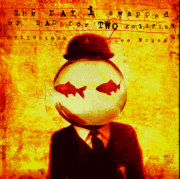
|
His work has appeared in translation in Italy, Spain, Holland, Norway, Germany, France, Brazil, Sweden, and Finland. His most recent novels published in the U.S. are Smoke and Mirrors (Avon, 1998), an anthology of short stories and Stardust (Spike, 1999), a charming and funny fantasy about finding your heart's desire. After finding the perfect, Gothic style house, he moved from Britain to Minnesota, where he now lives with his wife and three children. When he's not writing, touring or seeing to the myriad film projects he has in development, you can find him spending time with his wife, collecting computers and cats, reading aloud to two young daughters or donating his time to the cause about which he is passionate: freedom of speech for artists and writers. Neil spoke to us about how he got his start as an author, how he creates his novels, and what it was like going on tour with Tori Amos.
What did you like to read when you were growing up?
Anything. I was a reader. My parents would frisk me before family events. Before weddings, funerals, bar mitzvahs, and what have you. Because if they didn't, then the book would be hidden inside some pocket or other and as soon as whatever it was got under way I'd be found in a corner. That was who I was...that was what I did. I was the kid with the book. Now having said that, I tended to gravitate towards anything fantastical be it SF, be it fantasy, be it horror, be it ghost stories or anything in that territory. But I was definitely the kind of kid that read anything. The great thing about being in school in England back then was that the schools were all very old. And the schools being fairly old meant that you were actually dealing with a school library that was endowed sometime in the 1920s. That was the last time they went out on a big book buying expedition. And a few things had turned up in the 30s. I'd get to read these almost forgotten authors. I'd sit up there devouring the complete works of Edgar Wallace or G.K Chesterton. In fact, I remember my first encounter with Lord of the Rings was the first two books in battered old hardcovers. The Fellowship of the Ring and The Two Towers. It was all they had in the library, so I read them over and over again, wondering how it ended. And when I was about twelve I won the school English prize and they said, "What would you like as a present? You get a book." I said please can I have the Return of the King, so that I can find out what happens.
I understand that you also spent time as a journalist in your early years. How do you get your start?
Well, to start off, when I was writing fiction I was failing to sell the fiction that I was writing. I was very young. Although I did not choose to believe
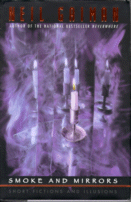
|
So I went out and bought myself a copy of the Writer and Artist Yearbook, bought lots of magazines and got on the phone and talked to editors about ideas for stories. Pretty soon I found myself hired to do interviews and articles and went off and did them. I thought, "Gee, it was easy to talk them into letting me do this. I wonder if they're going to actually let me go through with this?" I wound up for years after on my typewriter. Back when I had my typewriter, I had a little quote from Muddy Waters on it which said, "Don't let your mouth write no checks that your tail can't cash." This was a reminder that I was very good at talking myself into things, be it book contracts, articles or whatever. Then I'd have to find out if I could do it. Kind of the wrong way around, but it always worked very well for me. That feeling of sort of terrified adrenaline. Ok here I am with a book contract, what do I do now? I was first asked who I'd worked for and what I'd done. I have to confess that I lied appallingly. I listed all the people I'd like to write for, figuring that there was no way this editor was going to ring up every other editor in the world and say, "Has this guy ever written for you?" Although what is very, very peculiar is now, looking back at it, over the next five years I did write for absolutely everybody on my list. Which means that, although I thought at the time that I was lying, I was merely slightly anachronistic. Temporally challenged. So I was a journalist and wrote about three nonfiction books and would occasionally publish short stories, of which its probably most significant that at least three of those first few short stories have never been republished in any collection. Because they were awful. How they got published, I don't know. But I did actually put two of them into my short story collection Angels of Visitation. The one called "We Can Get Them For You Wholesale" and there was one called "The Case of the Four and Twenty Blackbirds." Because "We Can Get Them For You Wholesale" proved to be an astonishingly popular story, it was the only one of them that eventually made into Smoke and Mirrors.
I don't know if proud is the right word, but I am somebody who does not, on the whole, have the highest regard for my own stuff in that when I look all I get to see are the flaws. That's one reason why I love collaborating so much, because on something collaborative I can look at it and enjoy it. Whereas on something that's mine I tend to look at it and ask, "Why did I put that comma there?" I look at Smoke and Mirrors now and I'm feeling very satisfied with it, very pleased. It's a nice, serious big short story collection that the reviews of which amused me enormously, which normally doesn't happen. Kingsley Amis once said about how he handled bad reviews, "I let them spoil my breakfast, but I don't let them spoil my lunch." I'm somebody who can actually have his lunch spoiled by a bad review. But they don't spoil my dinner!
But your reviews have been marvelous.
Yes, the reviews have been marvelous. In the case of Smoke and Mirrors, it's the thing that I've enjoyed most of all. And what I've really enjoyed is that every single reviewer picks out something which is, as far as they are concerned, the highlight of the book, and then (in the way of all reviewers) picks out something that probably was undeserving of being collected. Except that, as the reviews keep coming in, everybody's choice of what the highlight of the book is changes. One person's highlight of the book is another person's, "Why on Earth did you put that in there?" Which wound up leaving me feeling very comfortable about the book. It's a big enough, serious enough book, and there are enough things in there. Nobody is expected to like everything in there, not even me. But everybody seems to like the book itself, which, for a collection of short fiction, is amazing. Normally, publishing a collection of short fiction these days is akin dropping rose petals into the Grand Canyon and waiting to hear the boom. In the case of Smoke and Mirrors, there really has been a little boom on it. I had this strange conversation with my publishers recently when I was in New York to do one of the signings. I asked, "What are the plans for bringing it out in paperback? When are we doing that? Is it going be a trade paperback or a mass market?" And they said, "We don't have any plans." I said, "What do you mean you don't have any plans?" And they said, "Well, it's still selling in hardcover. Right now, we're not doing anything. We're loving the fact that its selling and its selling steadily, and it's now in its third printing." Which for a short story collecting in this day and age is astonishing.
Yes. It's a very deep collection, I thought.
Everybody seems to have a favorite story or whatever. I love it as a collection. I love the fact that we did all this clever stuff. For example, because they sent me the cover early enough, we were able to figure out a back cover photo that matched with the front cover picture. And do all that kind of stuff…which was just fun. One rarely gets to do that kind of thing. I just feel very good about the package.
Yes. Especially with your background with Sandman and as an artist. You seem like a very visual person to me. So I would imagine that the covers, although they are important to all writers, they probably really affect you.
They really, really do. That's very true. And the package affects me. You know, the whole design, the whole feel of what you're getting. I always like the idea that you're giving people slightly more in some way than they're paying for. Which is why I got such a kick out of hiding a story in the Introduction.
Ah, Yes. "The Wedding Present."
Yes, "The Wedding Present." Not everybody who buys this book will even see it. The people that skip introductions will miss it entirely. They will never know that there was another story they could have read. Which I love. Packaged joy. I like the idea of doing that.
I'd like to move back in time a little bit. Let's talk about Neverwhere. I understand that project came about actually for British Television. So did you write the story for television or did you write the novel first? I've read the novel, but I haven't seen the television series.
Well, you haven't missed anything. The first thing I wrote
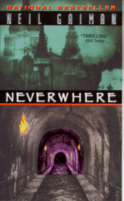
|
Because you see it that way in your mind.
Yes. Why is this character wearing this? Because that is what he is wearing. All of a sudden, you are dealing with a costume lady who doesn't necessarily see things your way. Now, I'm not asserting here that my way is right and the way of the director, or the costume lady, or the camera man or whatever is wrong. That's not even the issue. The issue here is simply the power of Because I Say So. I think that's what I was missing. So, for me, the novel was very much a way of being able to put that back. It was to go back to a world over which I had complete and utter control. And so I did and I wrote the novel. And then I wrote the novel again, having written it once for the U.K. I then wrote it again for America. Great fun, because I got to treat London as a slightly more imaginary and unreal place the second time through. It's funny because Americans occasionally get slightly huffy at me when I tell them that I've written Neverwhere more than once. On occasion, there is a slight sort of huffiness as if "What, you don't think we're bright enough to have read the English version?" And that's not actually it at all. In fact, I think the American version is a much better book for me than the English version. In the English version, I could say something like "he walked down Oxford street, " and know that everybody reading my book knows that Oxford street is a large metropolitan street in the central west-end of London filled with large shops. I don't expect anybody in Kansas to know that. If somebody in Kansas read that, they might think, "Oxford Street, maybe it's a street with a University on it or something." I would not make fun of that person for thinking that. They don't know -- nor should they. So what I tried to do was, in the American version, just add information, add details. Sometimes I'd hide the details or the information in the book. In the English one there is a joke which is at one point, one character says "We're going to this market but its in a really nasty area of London." And the hero says, "Where's that?" And she says, "Knightsbridge." Which is very funny if you know London, then you know this is the nicest area of London. But people who haven't been to London merely know that they are missing a joke there.
Did you change any dialogue?
Yes. I changed some of the dialogue. It's been interesting talking to Americans about this who, again, get a little bit huffy, asking, "What? We aren't good enough to get the words?" But that's not the point. For example, in the English version Richard, our hero, meets Door, our, for want of a better word, heroine. He stumbles over her bleeding on the pavement. In the American version, he stumbles her over bleeding on the sidewalk. English people ask me, "Why did you change that?" And I say, "Because it's a word that means two different things. The English word pavement literally means sidewalk. In America pavement is the paved area; it's actually the road. If I left her bleeding on the pavement in the American version, for reasons of cultural superiority, she would be in a different place. People would understand it differently." I wanted the story to be understood and to be read the same. There was definitely a certain amount of work done on both sides. I also wound up with an editor who didn't like a couple of sequences, especially one sequence. The American version I'd say is about 10,000 words longer and 1,000 words shorter than the English one. My favorite version of the book (I think you'd like it) is called the international version, which so far has gotten printed in several foreign countries. The French version and the Dutch version actually contain something closer to a complete text. Just to confuse everybody.
The hero of Neverwhere is Richard Mayhew. How did you go about creating him? He seems to have elements of Everyman. Things just keep happening to him. Did you sit down and plan him out, or did he just evolve as you wrote the story?
Well, a little bit of both. C.S. Lewis wrote an essay all about heroes and Everyman, where he said that, "It is very, very
| "If you're asking why I'm out there fundraising, why I'm out there manning the barricades, and why I'm willing to do whatever I can to support the Comic Book Legal Defense Fund...[it's] Because I come from a country without the First Amendment. Because most countries in the world don't have a First Amendment. There are erosions of freedom that occur at the borders of literature. The battles that many people assume were fought and won many years ago are still being fought." |
What are your writing habits like? Do you use the computer to write? How do you create?
It depends. It depends very much on the project. It would be easier to tell you the kind of writer that I'm not. I remember once being at a pub at a convention in England with a very well known fantasy author. I was saying, "Do you realize there are writers out there who are at their desks at 9 o'clock every morning, look up at 12:00, take an hour off for lunch and they're back there at 1, they go till 5:30 and that's it for the day? They don't write anymore. Now if you wanted to do that, why not get a real job?" And this well-known, famous, probably richer then I am fantasy writer said "Well I was always at my desk at 8:30, instead of 9. But other than that, you've just described my work day."
I've interviewed a number of authors who work that way.
I don't understand it! I mean, why not get a real job? It's
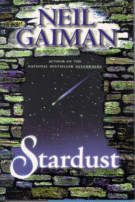
|
The narrator's voice is marvelous in that book. And it is very different in tone.
It was that voice that I wanted to get. It was for that voice that I used the fountain pen. I bought myself a proper honest to goodness fountain pen for that book. It was a breeze. Partly, I suppose, to fake myself into that mindset -- to go to that place. It was a lovely way of getting to that voice and getting to that place in my head. Then when I finished it in first draft, I actually got to properly do a second draft. Which I never get to do, normally. One could actually concentrate with Stardust, which is not something that I would normally concentrate on. Because, if one is writing novels today, concentrating on the beauty of the prose is right up there with concentrating on your semi-colons, for wasted effort (laugh). This is not even said with any particular grumpiness. It's not something anybody notices or particularly cares about. Nobody is out there saying, "What beautiful prose!" But, having said that, nobody is looking for it -- but people do respond to it. When I was on this signing tour (my giant Signing Tour From Hell which finished yesterday), I loved the fact that people kept coming up to me and saying, "I'm reading it out loud." I'm reading it out loud to my girlfriend at night. Or to my wife. Or I'm reading it to the kids. Just people who are responding to the rhythms, and responding to the beats of the words and wanting to read it aloud, feeling they were almost missing something if they weren't. And engineering ways in order so to do. Which I thought was lovely. I got a genuine thrill out of that.
Speaking of your signing tours. I know you've been doing a lot of appearances lately. What's the oddest thing that's happened to you at a signing?
Oh, that's sort of a hard one to tell. Partly because I get such astonishingly nice fans.
Some of whom have been known to faint, the way I hear it.
Well, yes occasionally some of them get a little wobbly. To be honest, I tend to attribute that much more to having stood up for four hours. You know, building it up in their heads as something. It would be the people that if you wandered over and said "Hi" you could have a nice conversation with them. But they've been standing in line for four hours building up in their heads wondering, "What am I going to say when I meet him?" They're thinking, "What can I say that will be good enough?" But yes, you occasionally get the fainting. The weirdest thing on this tour occurred in Romans at Pasadena, quite early on in the tour. When a young lady, she was actually number one in the line. At most of the signings what we actually did was hand out numbers. Just to control the crowd much better.
Like concert tickets.
Yes. It means you don't have to stand in line the full four hours. Which means, you've got 200 or 400 people. Much better to give more numbers as they get there. Because you're going to move them in and out of line anyway for the reading. It works very well. This girl was number one. She must have been there since 3 o'clock that day. At the end of the signing she comes over -- she'd been waiting around very patiently -- and she says, "Will you do me a big favor?" I said, "Well, what it is?" She says "Will you draw something with a sharpie on my back?" (You know, those indelible black pens). I said, "What kind of thing do you want me to draw?" She said, "Well, I think of myself as a pirate, so would you draw something piratical on my back?" So I drew a little pirate skull and crossbones on her back for her.
Was she wearing a shirt?
Yes, she lifted her shirt up so I could do the little skull and crossbones on her back.
Did she like it?
Well, she said, "Thank you very much," as soon as I'd finished. "Now I'm going to the tattooist to get it tattooed on." I said "Well, at least see it first. At least sleep on it. It's a sharpie. It will still be there tomorrow. At least sleep on it before you get it tattooed on." But I strongly suspect she did go straight down to an all-night tattooist to get the little skull and crossbones drawing tattooed on. So that was probably the strangest thing this tour.
That is unusual! I understand you also went on tour with Tori Amos.
Yes, last year. That was fun.
What was that like?
Rock and roll stars have it much better than writers when they're on a tour. Chiefly, I suppose, because rock stars are doing what they do when they get to a strange city. I'm not a signer, I'm a writer. Although through years of practice I'm getting to be quite a good signer. I really am. I'm not a signer. I'm a writer, and that is the reason why I actually do readings now. I pretty much insist on the readings. It at least gives me something I can derive a small amount of aesthetic enjoyment out of, rather then just sitting there for four hours saying, "Gwendolyn. What a lovely name; how do you spell it?" But what's fun if you're a rock star is you stumble off stage at midnight. Well, you stumble offstage at eleven, by midnight you get to climb on a giant tour bus. You go to sleep on the tour bus and sometime around 3 or 4 in the morning you wake up somewhere else, you stumble out, stumble into a hotel and wake up at about eleven. And then you have a few hours of your day before the sound check and the whole day begins. Whereas, if you're a writer, you stumble out of your singing at 11:30 p.m.. You get back to your hotel, praying that room service didn't stop at eleven. And you set your alarm for five-to-six because you have a 10-past-six checkout because you're a going to be getting on a plane to the next city where you are met by a very nice, efficient media handler lady who will take you to a TV station, a radio station or to your next interview. That's the biggest difference, I think. But the most important difference of all is that, if you are musician, every night you get to play music to people, but if you are writer every night you get to sign somebody's books. I mean the best part of it. I shouldn't sound as if I'm begrudging it or grumbling about it. The part that I enjoy most is a weird two-fold thing. When you're writing, what you hear is abstract numbers. It's a lovely thing to know you've sold 60,000 Neverwheres in hardcover or you've done 300,000 in paperback, or you've done 100,000 of this or a quarter-million of that. That means nothing. Those are numbers. They don't mean anything. They're just numbers. They're numbers that sort of translate into royalty checks. What is so wonderful about going on a signing tour is the numbers translate suddenly into people. Even though I must have signed for only 2% of the people who bought Neverwhere in paperback or whatever. These tiny percentages; they suddenly become real. You get faces. You get to say thank you to them for buying the books. They get to say thank you to you for telling them stories. That is wonderful. That is a magical thing.
You're so prolific. Have you ever faced the dreaded writer's block?
Oh, Yes. Continually. But I have good strategies. (laughs)
Will you share some of them with us? (laughs)
Sure. Strategy number one is that I always, or almost always, have at least two or three different things that I'm writing at any one time. In my experience, writer's block is very real. You'll be writing something and suddenly it stops. The characters stop talking. You've been happily just transcribing everything they've been saying, and suddenly they sit down and shut up. Suddenly, you are in deep trouble. It does happen. It's very real.
| "I work on a computer as if I'm working in clay. You put down the kind of thing that you mean and then you look at that for a few seconds. And then you work into it, you delete this word, you add that word. You change the tense. You decide that isn't quite what you meant and you use a thesaurus or whatever. There is no discontinuity. There is no break between your first and second draft. There IS no first or second draft. What you have is an ongoing, improving first draft." |
Well, that is unfair.
It is very unfair. I don't think anybody who isn't a writer would ever understand how quite unfair it is.
I'm going to move onto a different subject. I understand you've raised money to support the Comic Legal Defense Fund. Why do you feel so strongly about the issues that it represents?
Because I come from a country without the First Amendment. Because most countries in the world don't have a First Amendment.
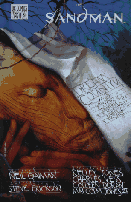
|
So the Comic Book Legal Defense Fund is out there preserving and fighting for, and sometimes winning and sometimes losing, the fight for First Amendment rights in comics and, more generally, for freedom of speech. For example, the State of California tax authorities announced that for tax purposes comics were not literature, but were sign paintings, and were to be taxed as sign paintings. It was the longest and most expensive case the Legal Defense Fund fought. We won, which was great.
On the other hand, there are cases which still scare me to this day that we lost. I mean the Mike Diana case. Mike Diana was a kid in Pensacola Florida who created a self-published fanzine with a readership of maybe 500 people, most of them swapped zines backwards and forewords with each other. The zine falls into the hands of the local police. A police officer pretends to be a kid into fanzines and buys a copy through the mail from Mike -- who suddenly finds himself spending three nights in jail, charged with obscenity, and then let out on bail. The defense brought famous, expert witnesses from New York and San Francisco. The prosecutor pretty much effectively demolished the expert witnesses standing up there and saying "this stuff is art" by pointing out to the jury that the standards of Pensacola, Florida are not the standards of the gay bath houses of San Francisco or the crack alleys of New York. So they found him guilty of obscenity. Which made him the very first American artist to be found guilty of obscenity for their own work, for making their own art. Now, let me tell you what was imposed upon him. Because this is the bit that I find scary. I find it a little bit scary that they found him guilty of obscenity, but I find it a lot scary that the sentence consisted of three years suspended day in jail sentence, a $3,000 fine, a journalistic ethics course to be done at his own expense, psychiatric counseling to be imposed at his own expense, 1000 hours of community service, and he was not allowed within ten feet of anybody under than age of eighteen. Bear in mind, this was a kid that worked in a convenience store. And finally, and this one is the piece de resistance, (which never made any newspapers, nobody was interested, because its comics and nobody cares about comics) Michael was forbidden under the terms of his sentence to draw anything that anybody might find obscene. The local police force was ordered to make 24-hour spot checks of his place of residence to make sure that he was not "comitting art." You know, to ensure that he wasn't drawing things for his own amusement while he was on the telephone and then tearing them up. The police were empowered, entrusted and ordered to break into his house 24-hour days and make random spot checks to make sure that he was not committing art. Now, we took the course to appeals court. Although we didn't get it overturned, the court at least allowed Mike to move to New York to do his sentence in New York. Where, to be totally honest, the police have better things to do then to break into people's houses at four in the morning to make sure they're not drawing. The case was appealed to the Supreme Court, who declined to hear it. Now considering this is the first case of an American artist being convicted of obscenity and, given the nature of the sentence, you would of thought they would have heard it. But they didn't. If you asking why I'm out there fundraising, why I'm out there manning the barricades, and why I'm willing to do whatever I can to support the Comic Book Legal Defense Fund -- that's why. Because things like that happen. There are erosions of freedom that occur at the borders of literature. If things like that can occur for somebody drawing comics in a way they probably couldn't if it was a novel published by a major novelist (or even a minor novelist publishing something through a real house) it's because those battles have been fought and won. The battles that many people assume were fought and won many years ago are still being fought.
Have you personally ever had any of your work censored?
Yes. I once when I was young nearly sent a Swedish publisher to jail for a bible story. I was involved in a comic called Outrageous Tales from the Old Testament where we retold, with a straight face, stories from the Old Testament. I told a story from the book of Judges, in which a man's wife is to quote the bible "whoring about on him." And he sent her away and then he goes and gets her back from her father. He misses her. They stop off in this little village over night. The townsfolk gather around on the road to Bethlehem, which is where they are and say, "That man that came to you tonight. Throw him out so that we may have sex with him. We want to rape him." And this man says "No. No. No. I will not. That would be a terrible thing. That would be a violation of all the laws of hospitality. And he's my guest. But I'll tell you what. He has a wife with him and I have a virgin daughter whose never known any man. You can have them." They get known and abused all night and are left dead on the doorstep the next morning. When the guy gets up the morning he finds his wife dead on the doorstep and takes her home and cuts her into thirteen bits and into twelve locks and sends one to each of the tribes of Israel. So I told that story and did it fairly straight, and next thing I knew I had a Swedish publisher about to go to jail because there is a Swedish law forbidding the depiction of images of violence against women. That particular bible story is filled with images of violence against women. I think it was more or less only the fact that it was from the bible and told completely straight that got him off.
Let's turn to another subject. How has being a father affected your work?
Well, I suppose chiefly I get to steal from them. Both of my kids picture books. The one that I'm just about to do now and the last one I did, The Day I Swapped My Dad the Two Goldfish I completely stole them from my two kids. As I did with the next book. The Day I Swapped My Dad the Two Goldfish came about because my son looked at me one day when I was saying something horrible and unreasonable to him like, "Isn't it time you went bed?" He was about eight and he looked up me and his lower lip trembled and he said "I wish I didn't have a Dad." He said, "I wish I had something good, like some goldfish." He then stomped off to bed angrily. I thought, "What a great idea!" The seed having been planted in the back of my head, five years later I sat down and wrote The Day I Swapped My Dad for Two Goldfish which then turned up on the Newsweek list of best books. The biggest thrill I've got from The Day I Swapped My Dad For Two Goldfish is just the fact that its turning up now on the Scholastic edition that kids bring home with them from school. You know if you have a young kid with the list of books they take home from school. That's where it is. It's on that list. I love that. The great corrupting of the youth of America.
Not just of England (laugh). What do you feel like the greatest challenge you've had to face in your professional life so far?
I honestly don't know. My career has been somewhat like climbing stairs. You know, you learn fairly quickly that everything is sort of the same amount of effort. In many ways, it was much, much harder to get the first book contract. The hardest thing probably overall has been learning not to trust people, publicists and so forth, implicitly. I'm by nature a very trusting person. And its only, very slowly, you sort of learn "Well, ok, Publisher X, despite claiming to us that the book was not remaindered, has actually secretly remaindered it into Australia.
Did that happen to you?
Oh, yes. Things like that. And Publisher B, instead of actually invoking the clause that says "whereby they have to sell off the remainders" had claimed that what they are actually doing is technically not remaindering but deep discounting them, so that they don't have to do that, and so forth. Slowly you learn that you really have to make sure that you have good people looking out for you, and that you think of everything. (laughs) Which is very alien to me. It's not how I think.
It's sort of counter-intuitive to a creative personality, I think.
No. I agree completely. I was always so relieved that anyone wants to publish anything I've written. In many ways
| "As far as I'm concerned, the entire reason for becoming a writer is not having to get up in the morning. It's not writing when you don't want to, and writing late at night if you want to." |
You mean like the two villains from Neverwhere?
Yes, Mr. Croup and Mr. Vandemar show up and they say "It's over. You are now going to have to get a real job." I will have gone to that point, seemingly expecting that this writing thing would go on for ages. I'd then think, "Well, it's a fair cop." I would go off and have to get a real job and get up the morning and wear a suit. I suppose I'd secretly make some things up in my head for myself before I went to bed at night, or before I go to sleep anyway lying in bed, sort of making up little stories. But I'd never be able to tell anybody. That's the thing I'm scared of.
It's not going to happen.
Well, I hope not.
What are your pet peeves in life? Do you have any pet peeves?
I'm not terribly peevy. What are my pet peeves? I don't know really. I wish you could get better radio in America. I wish somebody would give NPR the money to be a real radio station. I'm fairly peeveless. I suppose, right now coming off this tour, I'm not so much peeved as I'm actually kind of thrilled that I can do a signing tour on which I got to break records in most of the stores that I signed at. Yet I'm still managing to do this while somehow still remaining one of those authors who hears, "Oh you write books. What name do you write under?" I feel like I'm getting away with something, because I'm doing it all under the radar right now. So in some ways its kind of a peeve because you think, "Well, wouldn't it be nice if you went into a store and this actually translated itself into people knowing who you are and so on and so forth." (laughs). On the other hand, this is not something that I particular worry about. I think I'm astonishingly lucky to be where I am at this point.
What projects are you working on now?
Well, once I've finished recovering from the signing tour, there are a couple of things. There's a children's book that should have been finished by December that's been sitting on hold now for a couple of months. I'm actually feeling very guilty because I left four kids locked in a closet, three of them have been dead for years and years and years. I'm feeling guilty. They've been in there for months and I have to go and get them out. Then there's a big novel and various sorts of other things. Like getting Neverwhere the movie, which looks like its now starting to gather some serious momentum. The movie is with Jim Henson Productions and Dimension Films.
What's the latest word on the Sandman movie?
It's not something I have any control over. Its one of those things when I did the deal to write Sandman it was in those antediluvian days when all rights were owned by D.C. Comics, who is owned by Warner Brothers, which means Warner controls Sandman. I wish things were different, but they're not.
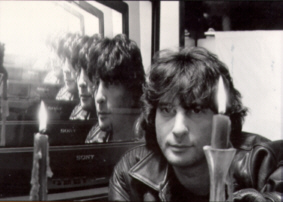
|
Well, yes. I may do a little tenth anniversary project to say thank you to my editor who really wants me to. Karen Berger at D.C. Comics. She's always been the single most terrific editor anybody could ever want. If the time is there, I will do her a little Japanese Sandman story.
Marvelous. And what's the word on the Phantom Princess film?
Ah, Princess Mononoke. I don't know what title it will eventually come out under when it comes out.
How's that coming? That's in production, isn't it?
Yes, I wrote the English translation. It has a wonderful cast, including: Claire Danes, Minnie Driver, Billie Bob Thornton, Billy Crudup and Gillian Anderson. With such a fantastic cast, one hopes for the best dialogue one can give them. It comes out sometime this summer from Miramax.
Is there anything else that you'd like to say to your fans?
Mostly, I'd just like to say thank you for coming out in such hordes during the signing tour. The most amusing thing I heard was that we'd actually broken the previous record in this store in Portland we signed in. Powell's of Portland, which is a wonderful store. An astonishingly wonderful, huge store. In fact, the previous signing record there had been set by Martha Stewart. Thank you to everybody for breaking the Martha Stewart record. When I heard about that I was enormously amused.
Note: We may receive a commission through product links in this article
Return to the March 1999 issue of The IWJ.
More from Writers Write
